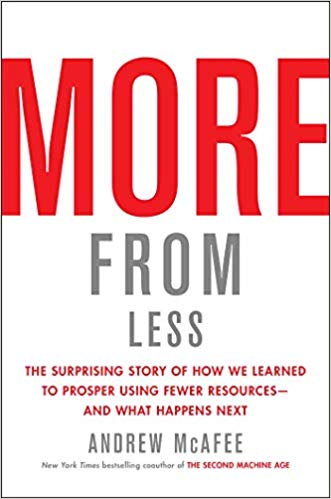
How can it be that the United States continues to experience tremendous economic growth- while using fewer resources in the process? That’s the driving question behind this episode. Host Russ Roberts welcomes back MIT’s Andrew McAfee, this time to talk about the “dematerialization” of the economy. McAfee (along with another previous guest, Jesse Ausubel) describes how the economy of today actually uses fewer total molecules than in the past, resulting in lower total energy use concomitant with higher output. So what is this seemingly miraculous process of dematerialization? When did it start, and how long might we expect it to continue?
For better or worse, McAfee says that while the United States may be considered to be totally dematerialized, that’s not the case throughout the world, and especially in the developing world. An interesting question not much discussed in this episode is what obligation the US might have to help other nations dematerialize themselves.
1- The conversation starts with the original “dismal scientist,” Thomas Malthus, who McAfee describes as a lousy forecaster who was “broadly correct as a historian.” What did Malthus get wrong, and in what way(s) was he right, according to McAfee? What about Jevons and Marshall?
2- What were the four points of the original Earth Day movement, according to McAfee, and which of them does he believe to have been warranted? (Hint: Think CRIB.) Which of the two were not, and why?
3- McAfee describes how throughout US history, we saw GDP rising in lockstep with resource use until sometime in 1970s, when a decoupling began to occur. (For example, he notes the US reached peak paper and timber use 1990.) When do you think the US will hit peak plastic? What causes this dematerialization? (Bonus points if you can use a supply and demand graph in your answer!)
4- How is recycling a different sort of phenomenon from dematerialization? What does this tell us about the relationship between public policy and resource use generally?
5- Toward the end of the conversation, Roberts and McAfee turn to the downsides of economics and resource use, such as climate change. What does McAfee suggest as an antidote to the problem of climate change? To what extent are you in agreement with him?


Comments are closed.